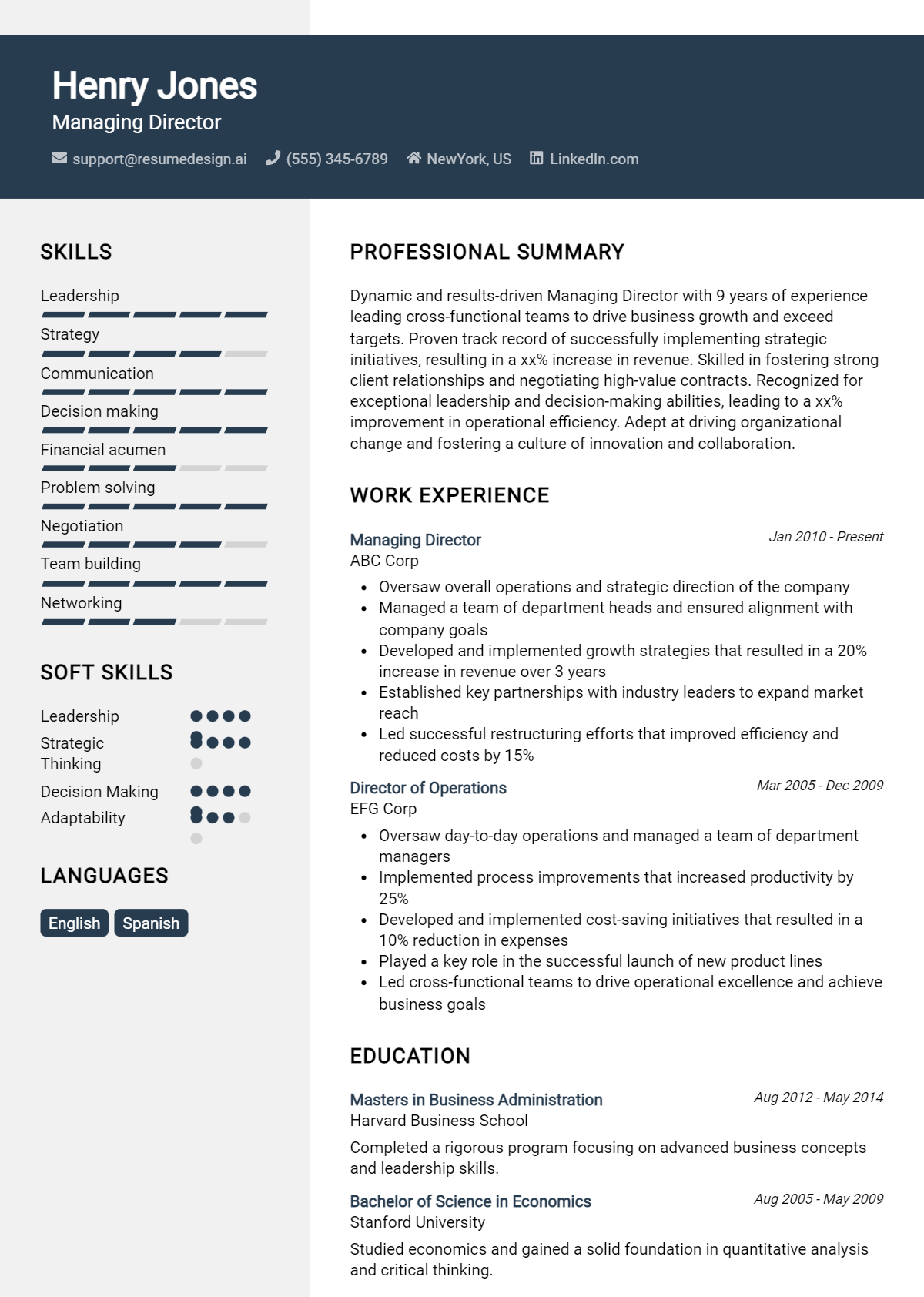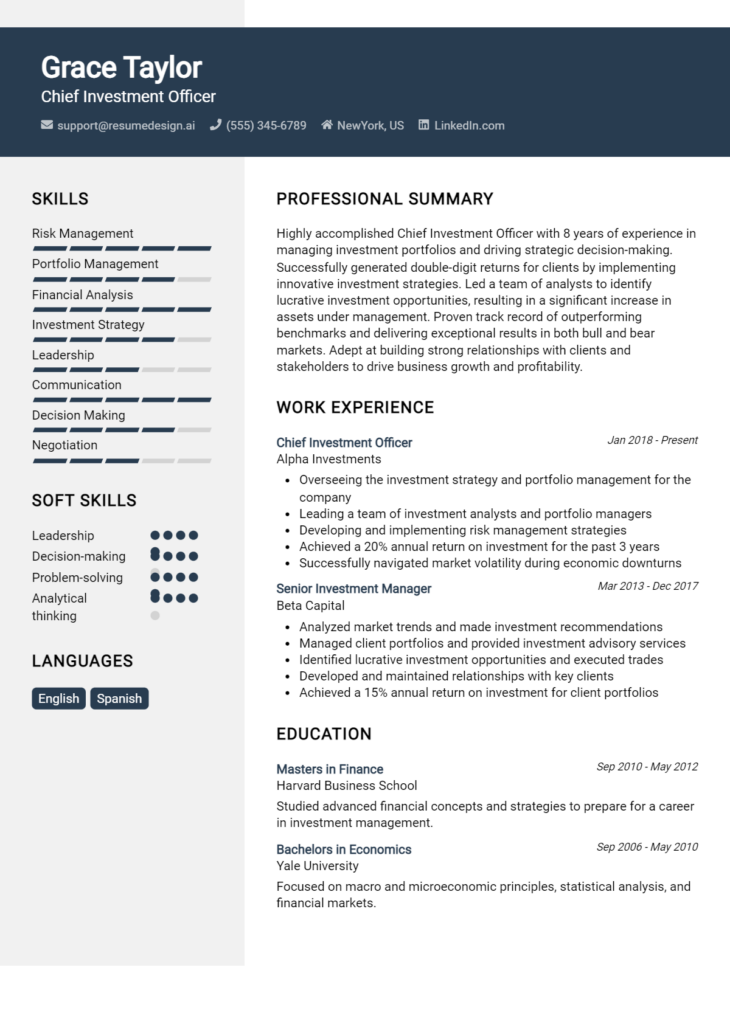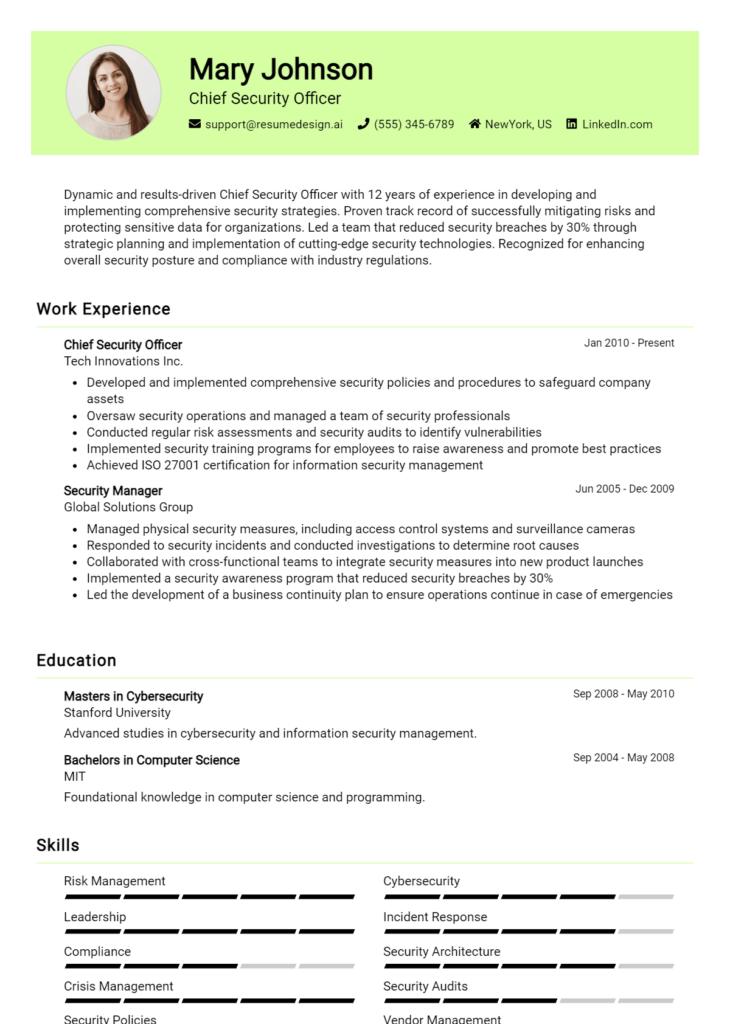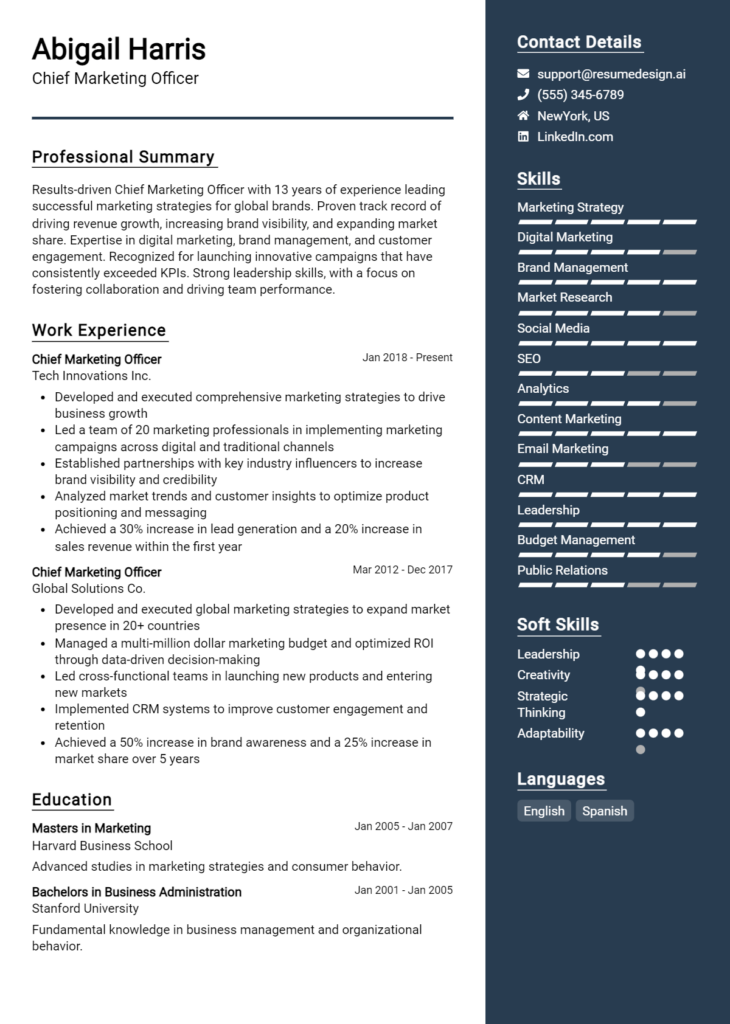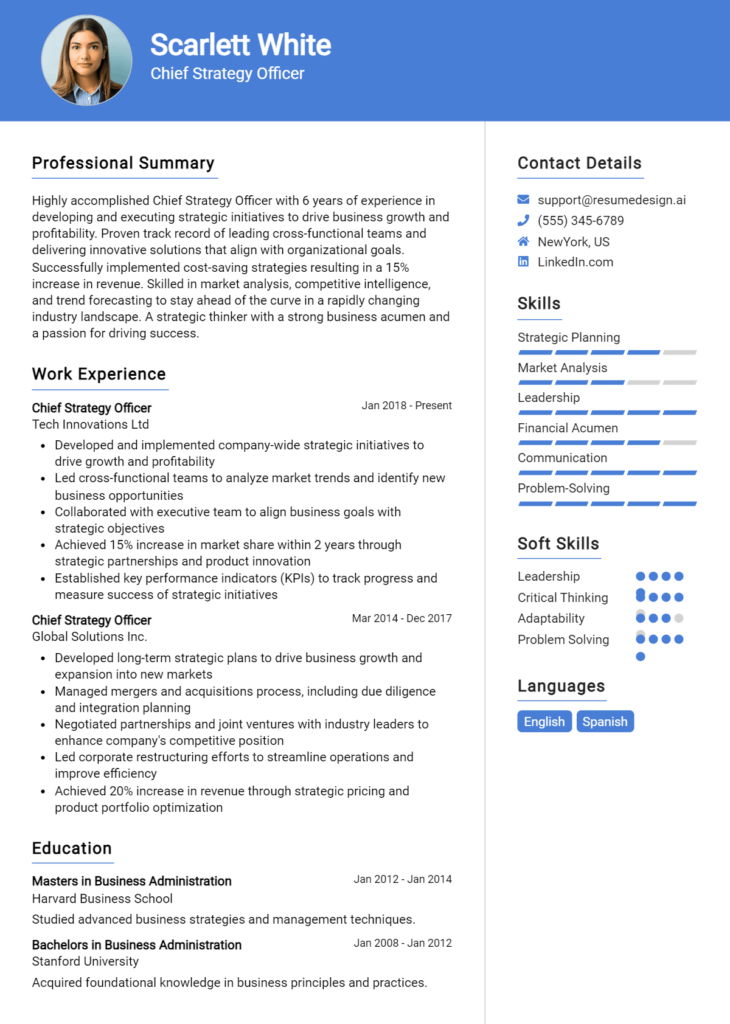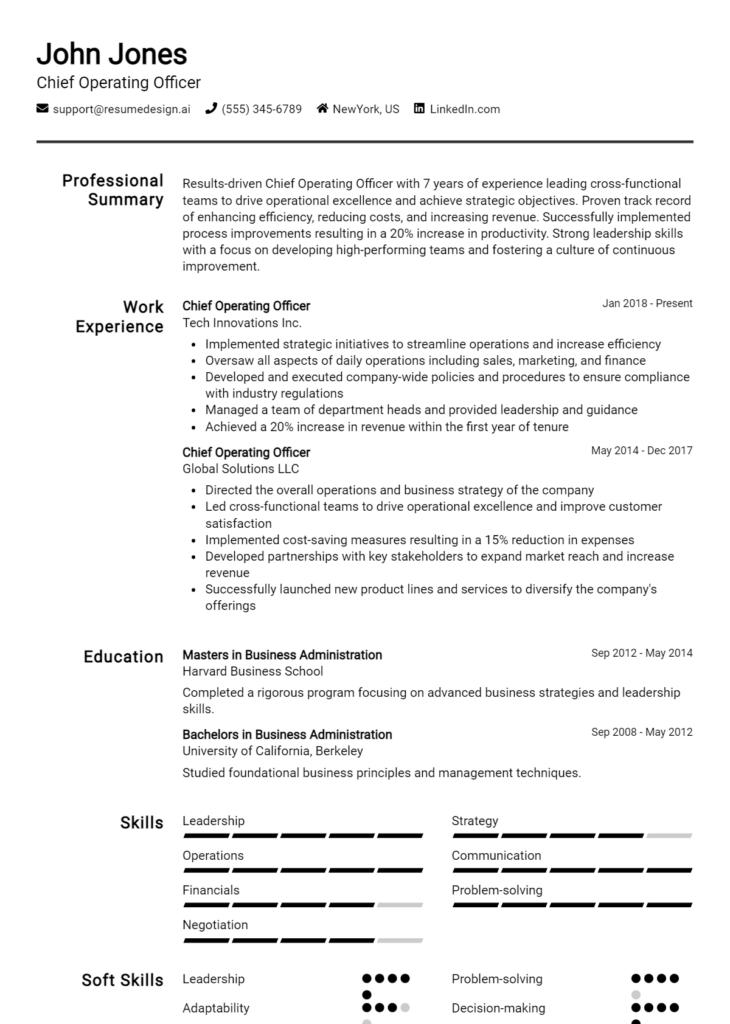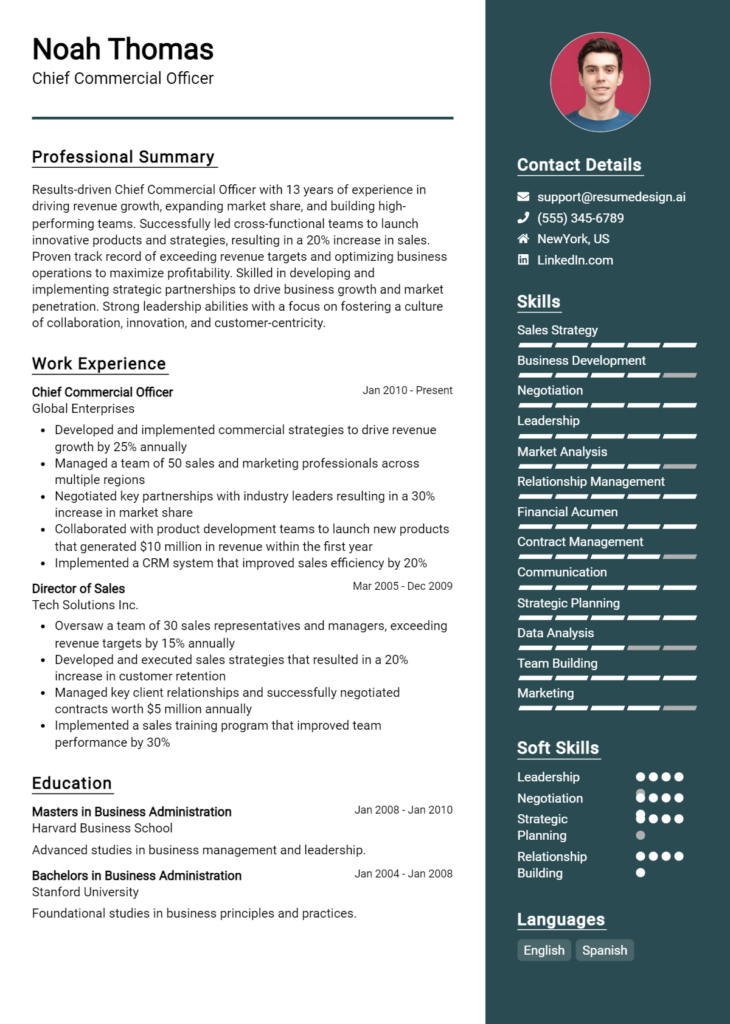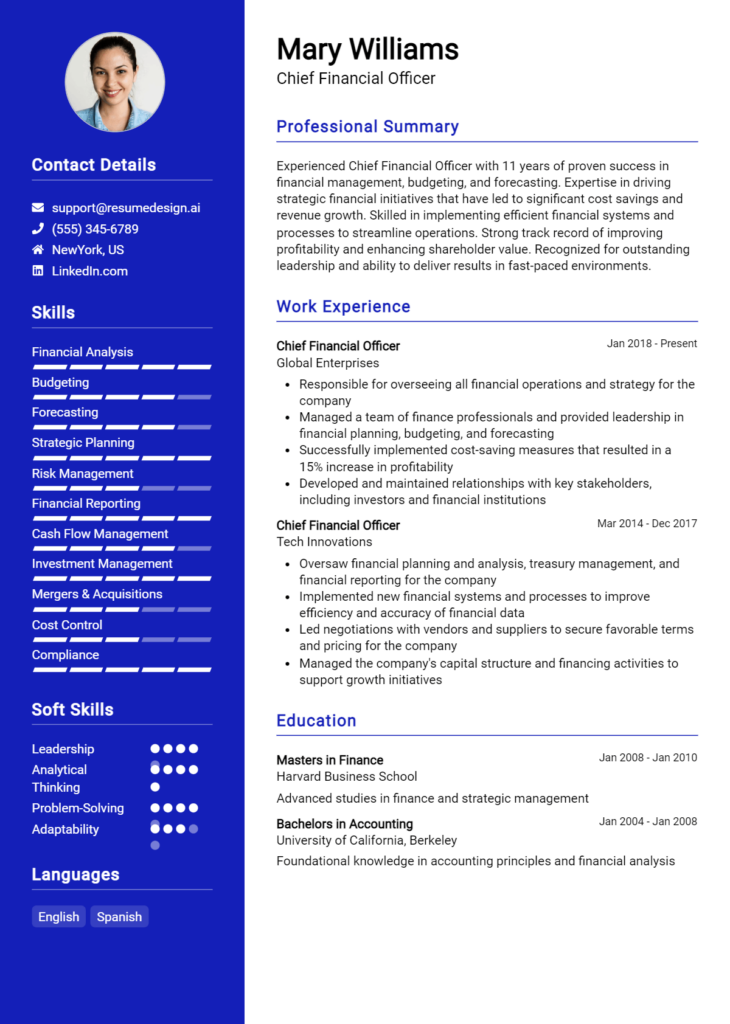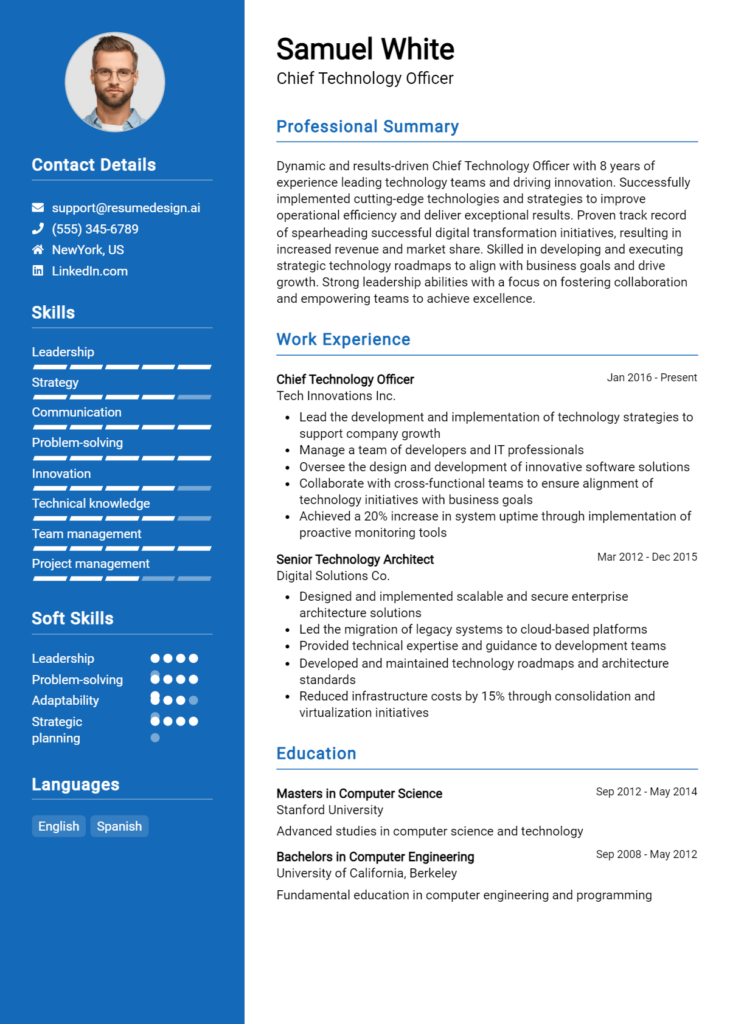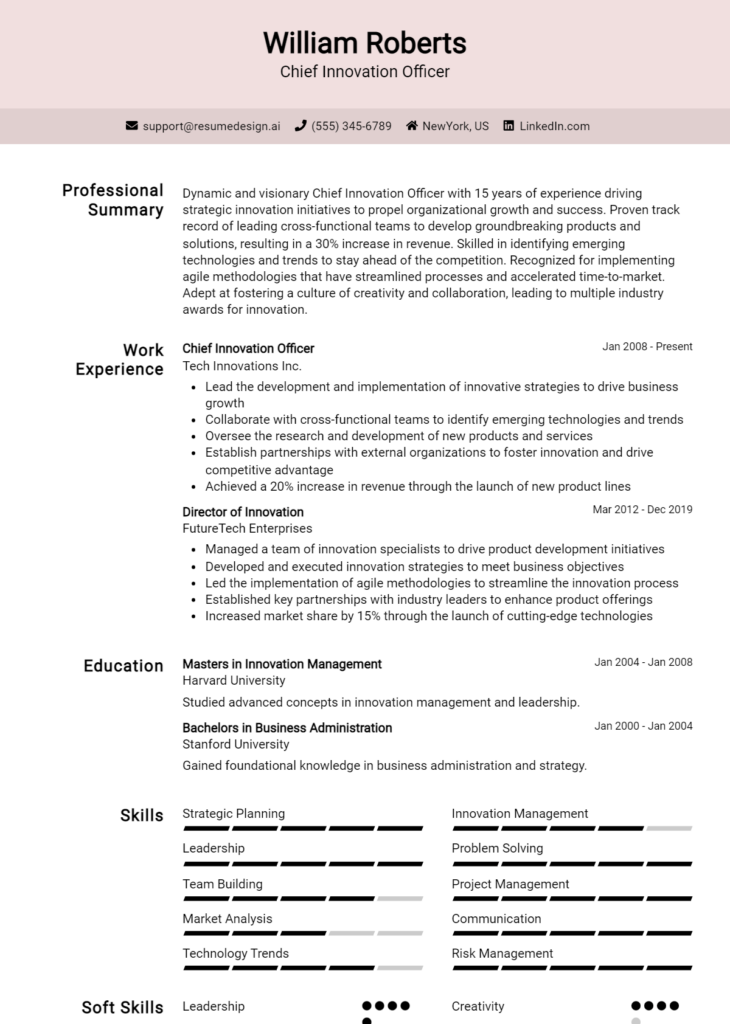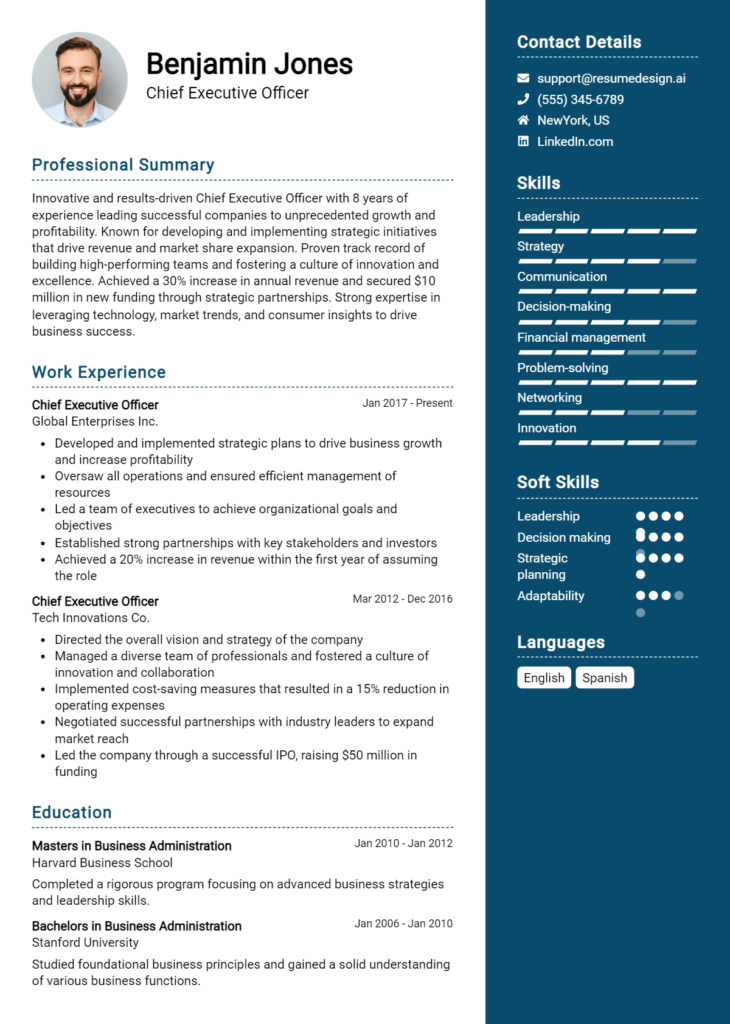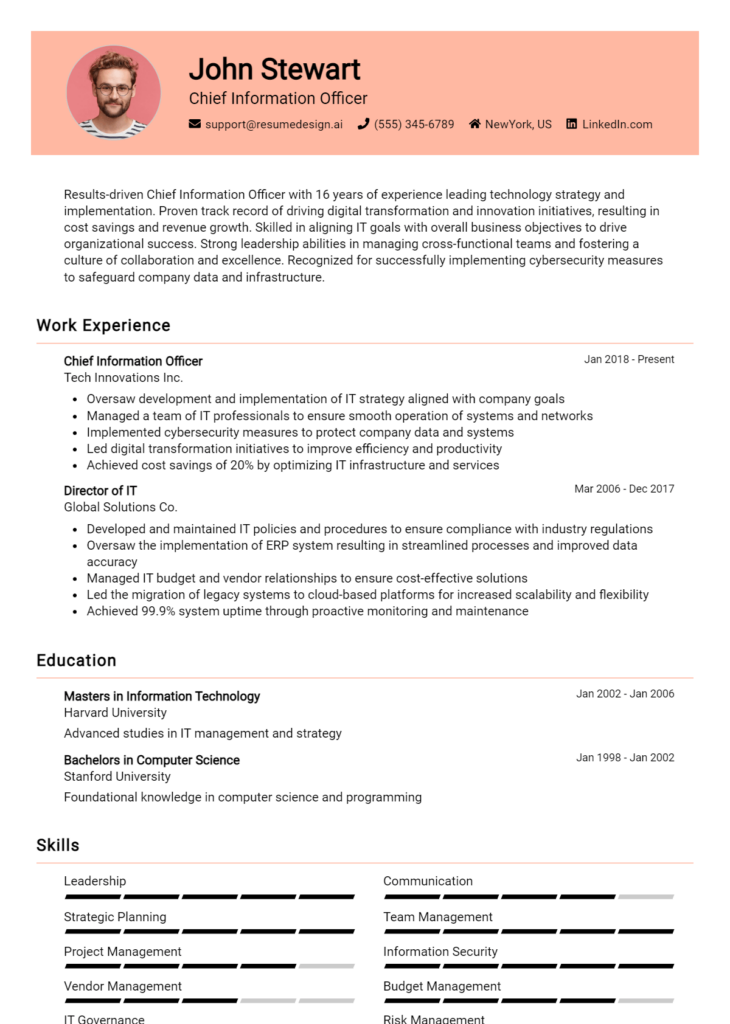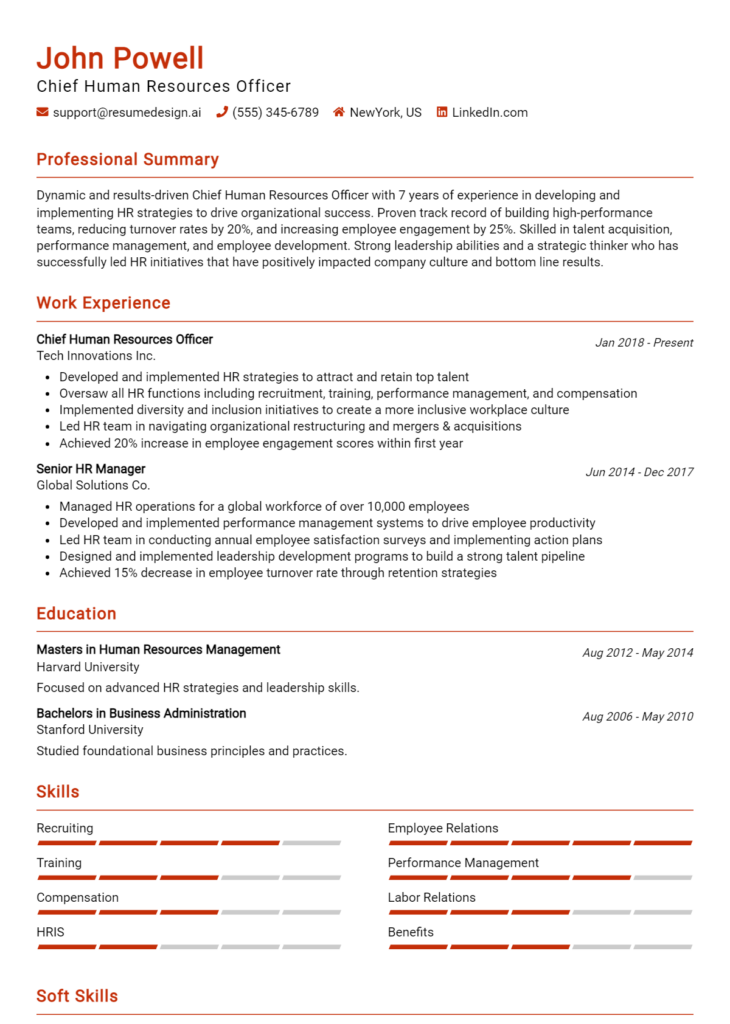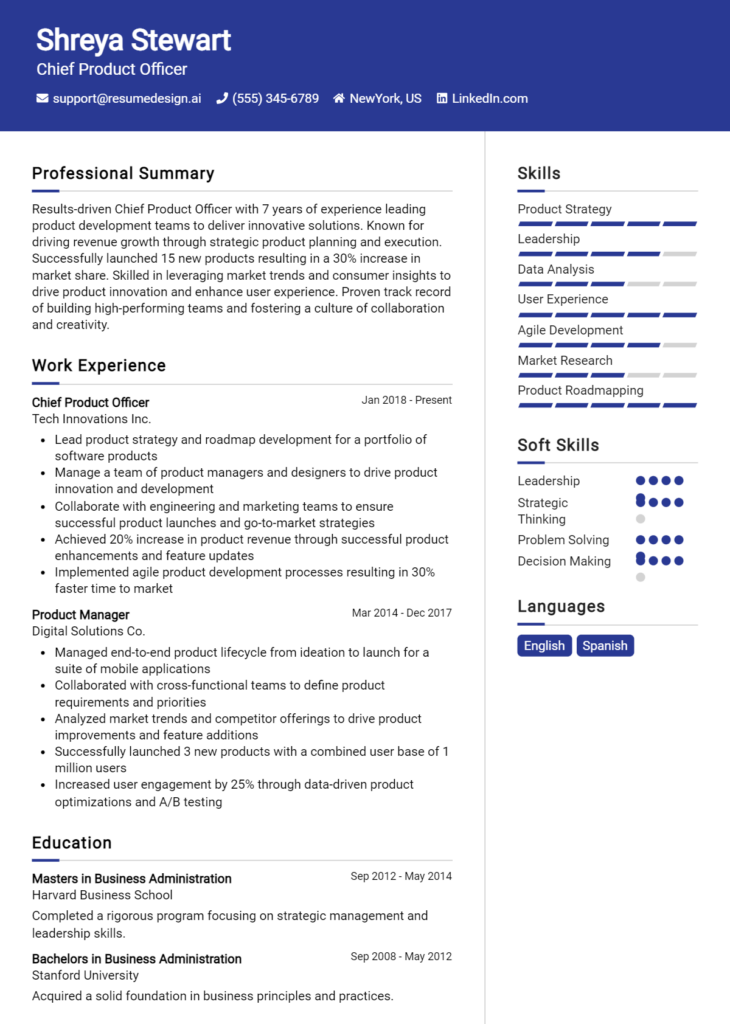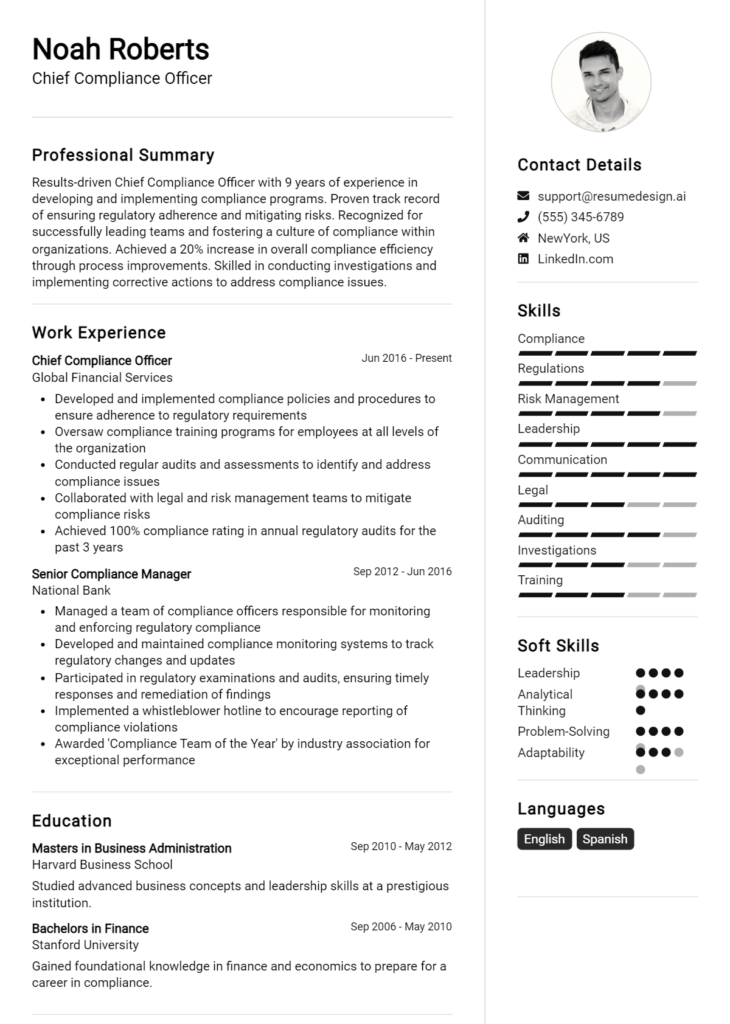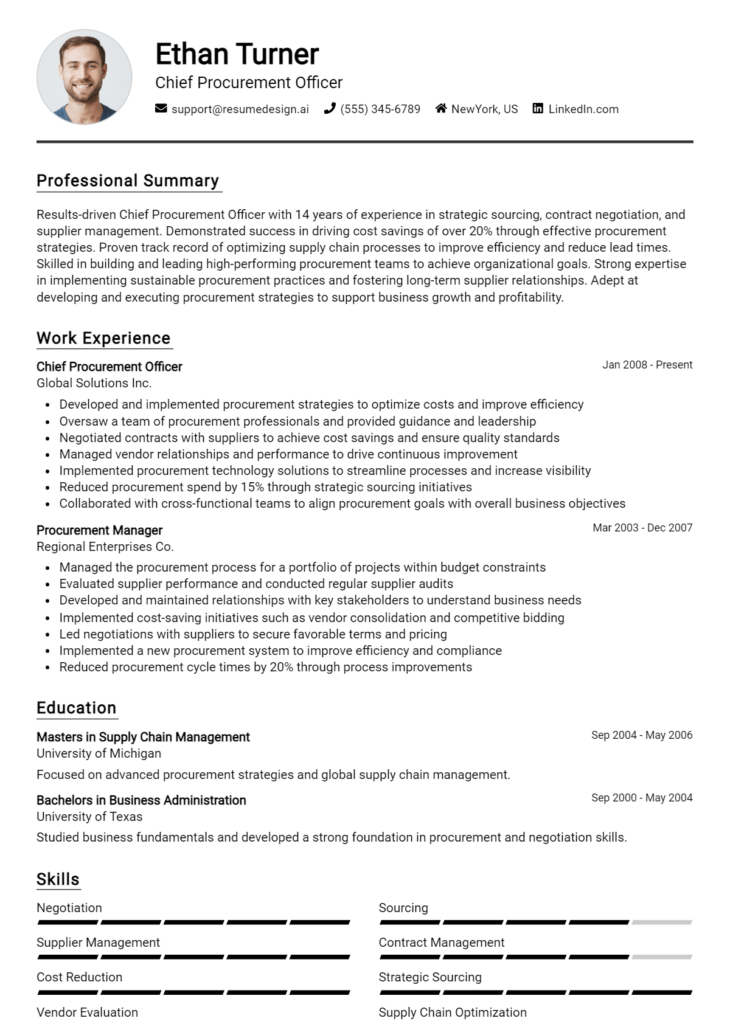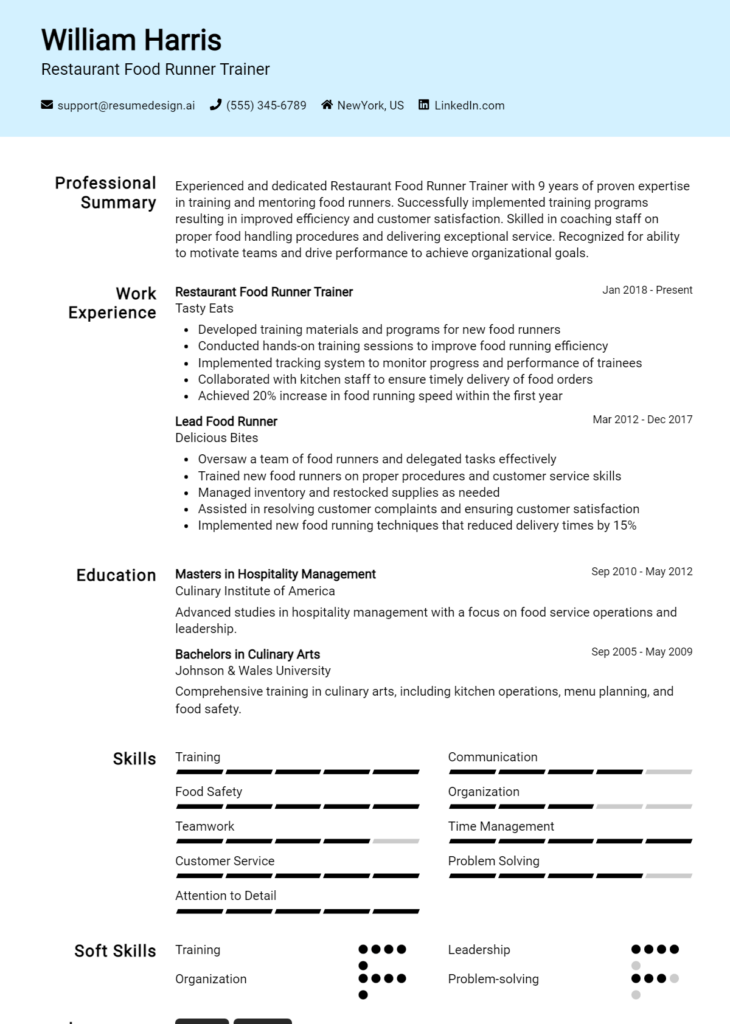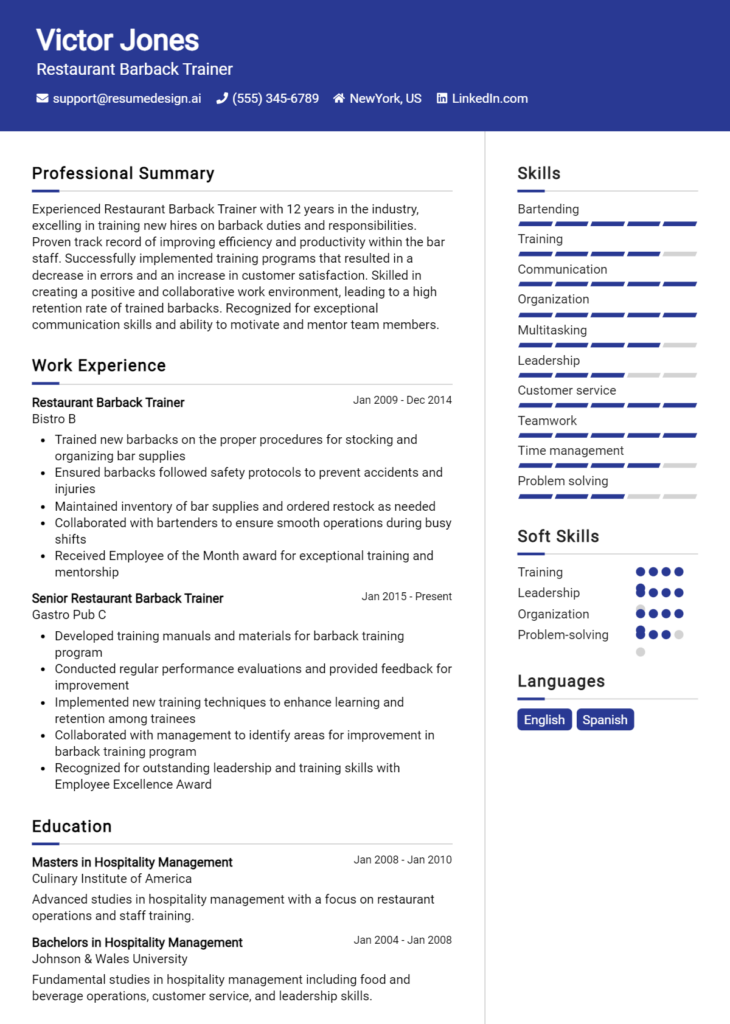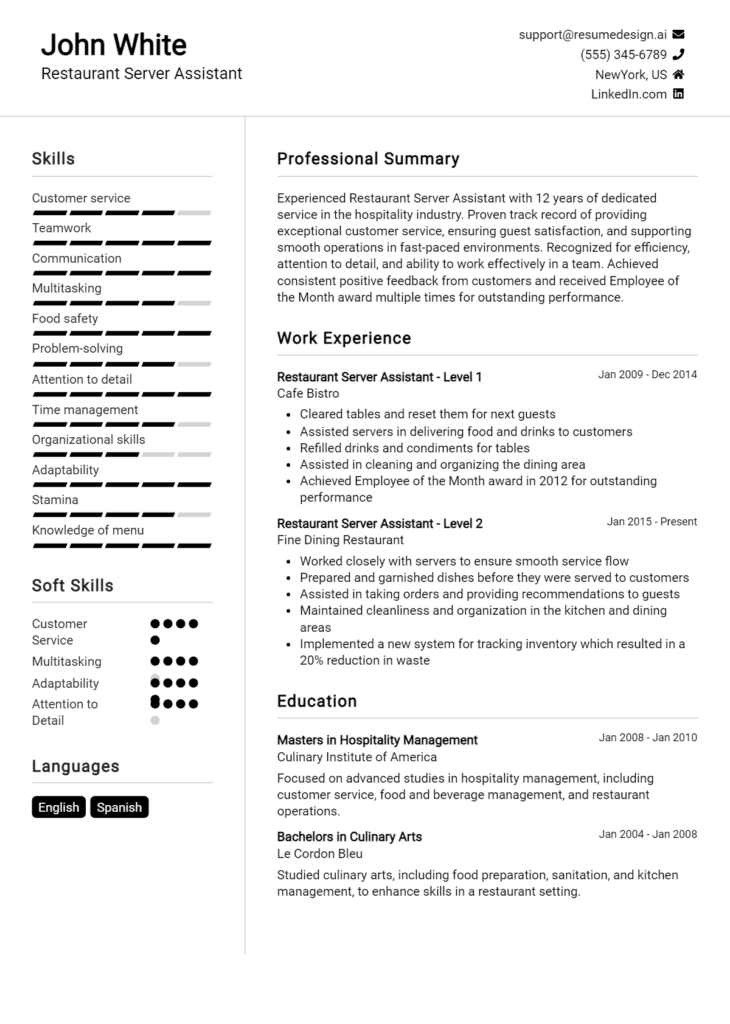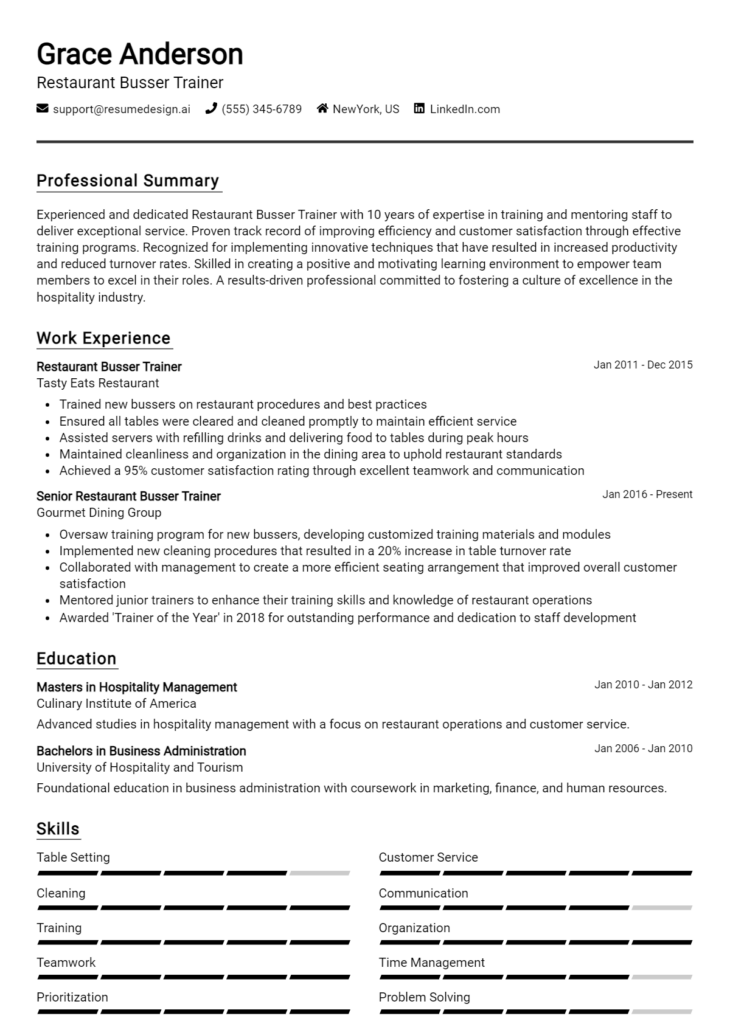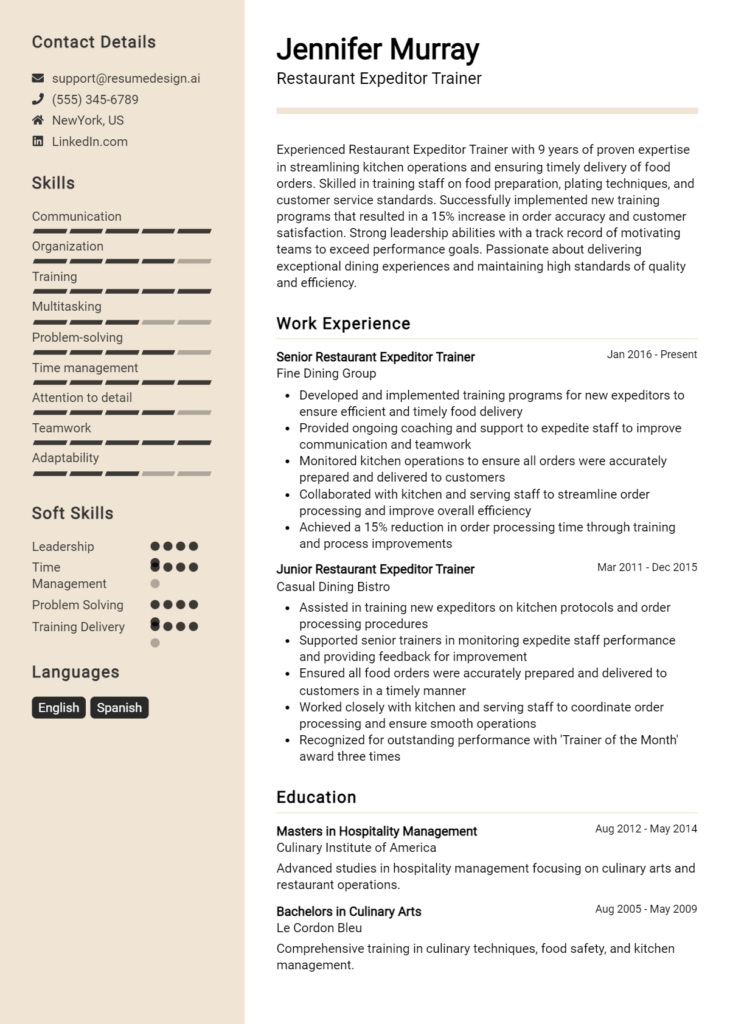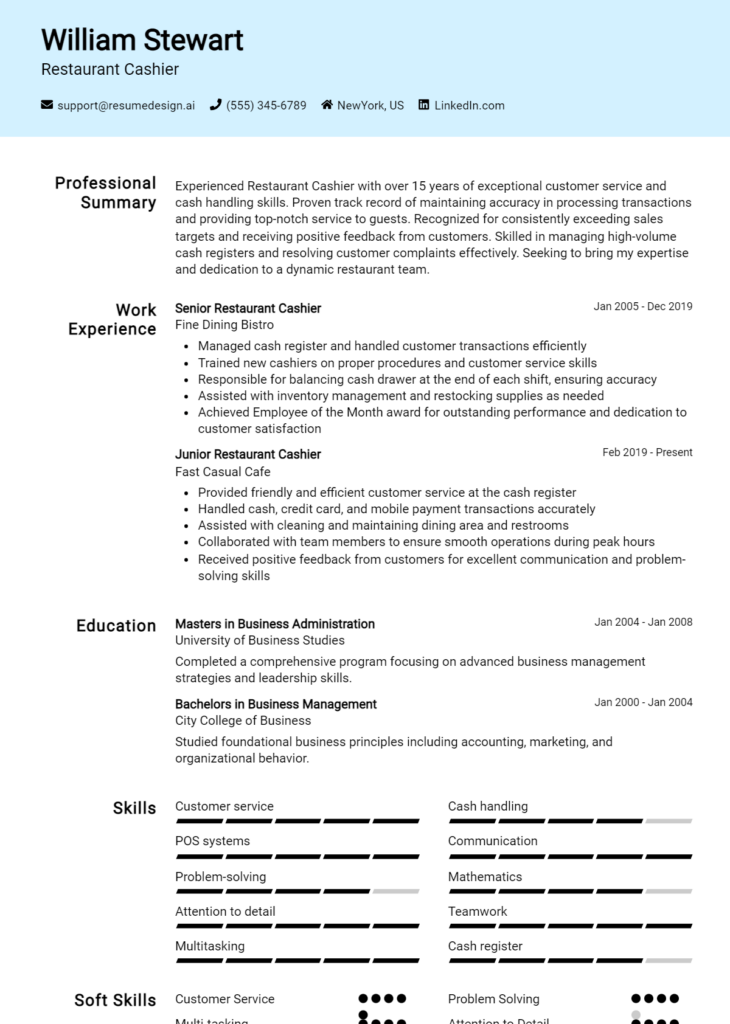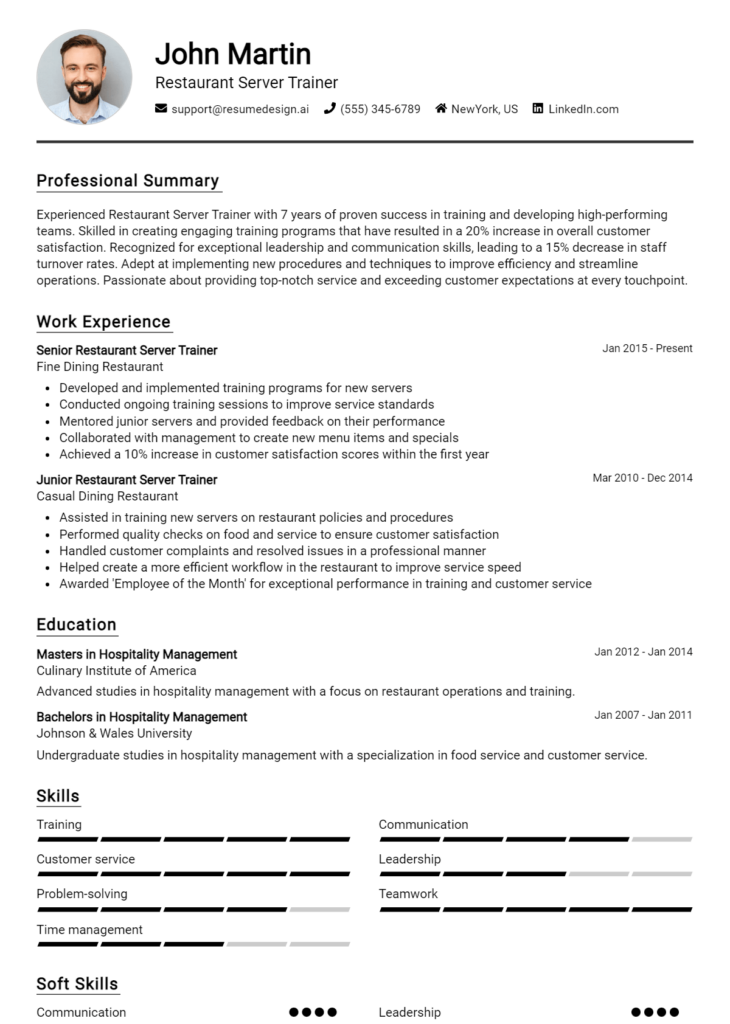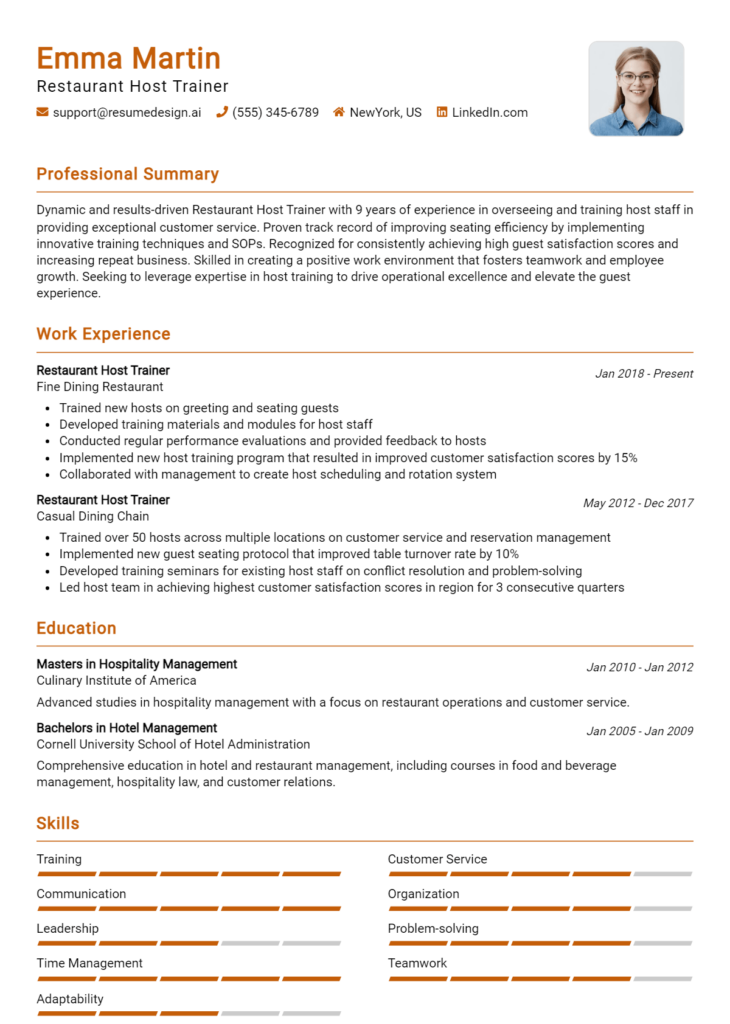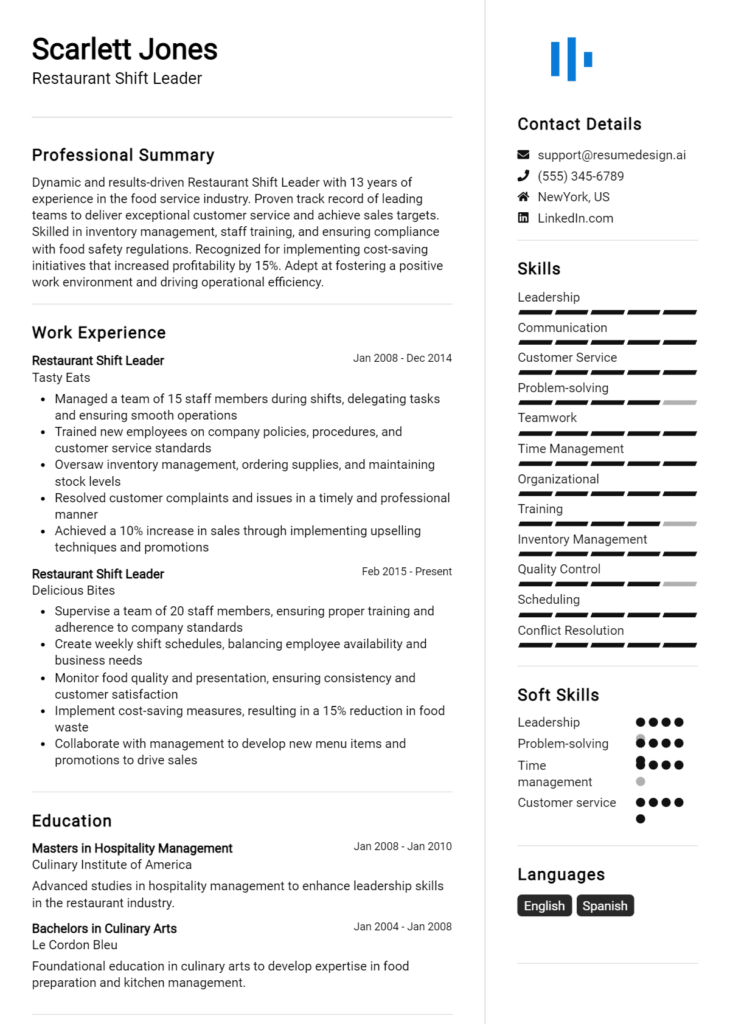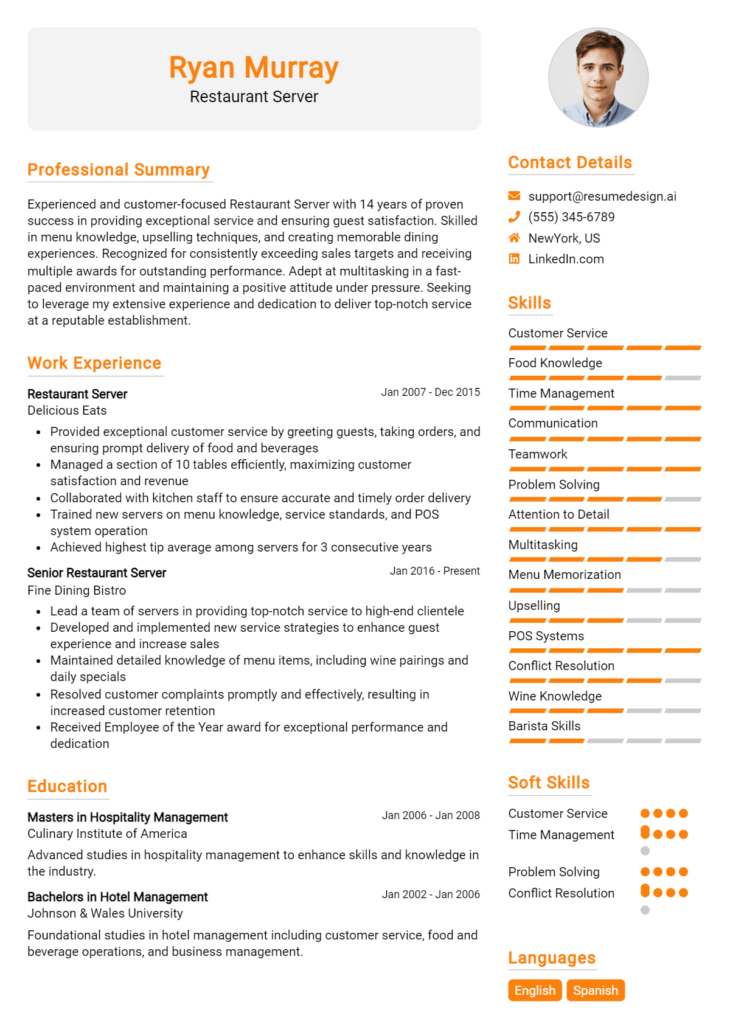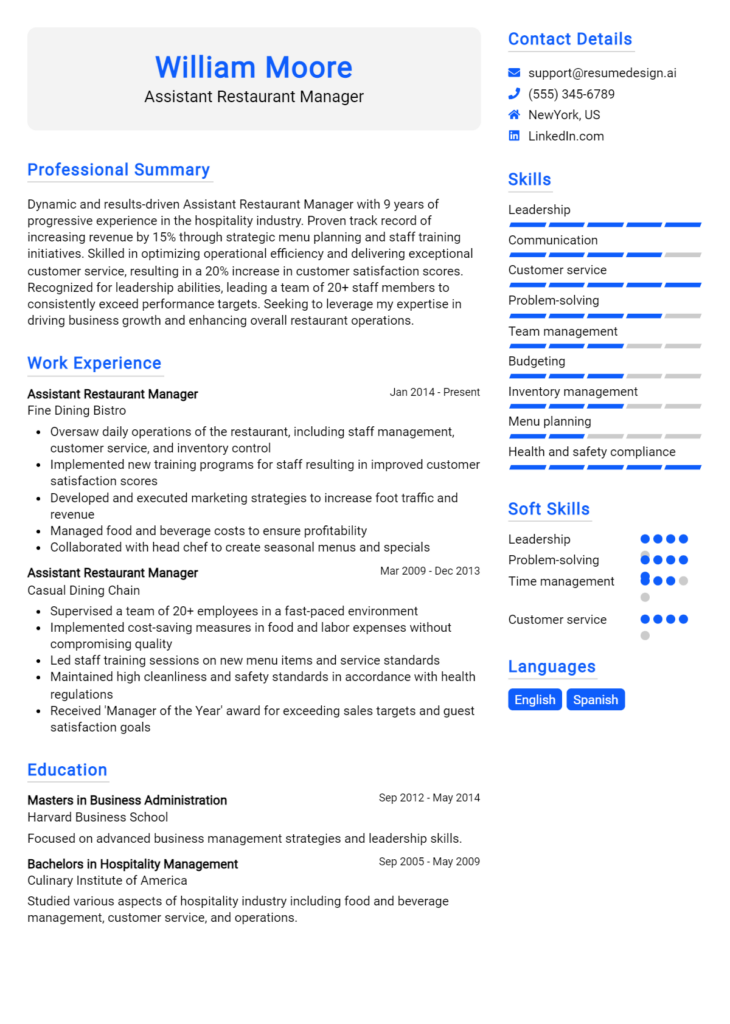Managing Director Core Responsibilities
The Managing Director plays a vital role in steering the organization towards its strategic goals by bridging various departments such as finance, operations, and human resources. Key responsibilities include overseeing daily operations, formulating business strategies, and ensuring effective communication among teams. Essential skills encompass technical expertise, operational acumen, and advanced problem-solving abilities. These qualifications not only drive organizational success but also showcase a candidate's potential through a well-structured resume, highlighting their strategic impact and leadership capabilities.
Common Responsibilities Listed on Managing Director Resume
- Developing and implementing company strategies and policies
- Overseeing daily operations and ensuring efficiency
- Leading cross-functional teams and fostering collaboration
- Managing financial performance and budgeting
- Building and maintaining relationships with stakeholders
- Identifying growth opportunities and market trends
- Ensuring compliance with regulations and standards
- Driving organizational change and innovation
- Reporting to the board of directors and stakeholders
- Coaching and mentoring senior management
- Assessing risks and implementing mitigation strategies
- Representing the company at industry events and conferences
High-Level Resume Tips for Managing Director Professionals
In today's competitive job market, a well-crafted resume is essential for Managing Director professionals who aspire to make a lasting impression on potential employers. Your resume often serves as the first point of contact, making it crucial to present a compelling narrative of your skills, achievements, and leadership capabilities. A strong resume not only showcases your professional experience but also reflects your strategic vision and ability to drive results. This guide will provide practical and actionable resume tips specifically tailored for Managing Director professionals, helping you stand out in a sea of qualified candidates.
Top Resume Tips for Managing Director Professionals
- Tailor your resume for each application by aligning your skills and experiences with the specific job description.
- Showcase relevant leadership experience, highlighting roles where you've successfully managed teams or projects.
- Quantify your achievements with specific metrics, such as revenue growth percentages, cost savings, or market share increases.
- Highlight industry-specific skills that are crucial for the role, such as strategic planning, financial acumen, or operational efficiency.
- Use impactful language that conveys your ability to lead and innovate, focusing on action verbs and results-driven statements.
- Include key accomplishments in each role, demonstrating how your leadership has directly contributed to organizational success.
- Incorporate relevant certifications or training that bolster your expertise in the field.
- Maintain a clean and professional format that enhances readability, ensuring your most important information stands out.
- Keep your resume concise, ideally within two pages, while ensuring all information is pertinent to the Managing Director role.
- Consider adding a summary statement at the top that encapsulates your career trajectory and leadership philosophy.
Implementing these tips can significantly increase your chances of landing a job in the Managing Director field. By crafting a targeted, achievement-oriented resume that resonates with hiring managers, you position yourself as a top candidate ready to lead and inspire within an organization.
Why Resume Headlines & Titles are Important for Managing Director
In the competitive landscape of executive recruitment, a well-crafted resume headline or title is crucial for a Managing Director. This brief yet powerful phrase serves as the first impression for hiring managers, encapsulating a candidate's core qualifications and professional identity. A strong headline immediately grabs attention, providing a snapshot of a candidate’s expertise and career highlights. It should be concise, relevant, and tailored to the position being applied for, serving as a compelling invitation for hiring managers to delve deeper into the resume.
Best Practices for Crafting Resume Headlines for Managing Director
- Keep it concise—aim for one impactful phrase.
- Make it role-specific by including the title “Managing Director.”
- Highlight key skills or areas of expertise relevant to the position.
- Use action-oriented language to convey leadership and initiative.
- Incorporate metrics or achievements to substantiate claims.
- Avoid jargon and overly complex language; clarity is key.
- Ensure it aligns with the job description and company values.
- Revise and tailor the headline for each application to maintain relevance.
Example Resume Headlines for Managing Director
Strong Resume Headlines
Transformational Leader Driving 30% Revenue Growth in Competitive Markets
Strategic Visionary with 15+ Years of Experience in Global Market Expansion
Results-Oriented Managing Director Specializing in Operational Excellence and Team Development
Weak Resume Headlines
Experienced Professional Seeking New Opportunities
Managing Director with a Diverse Background
The strong headlines are effective because they clearly communicate specific accomplishments and expertise, making them memorable and relevant to potential employers. They also align with the expectations of a Managing Director role, showcasing leadership and strategic impact. Conversely, the weak headlines fail to impress because they are vague and lack substance, providing no insight into the candidate's unique qualifications or value proposition. To stand out in a crowded field, candidates should focus on crafting headlines that resonate with their target audience.
Writing an Exceptional Managing Director Resume Summary
A well-crafted resume summary is essential for a Managing Director as it serves as the first impression a candidate makes on hiring managers. This brief yet powerful statement should succinctly encapsulate key skills, extensive experience, and notable accomplishments that align with the demands of the role. A strong summary not only captures attention but also establishes the candidate's suitability for leadership positions, making it imperative to tailor each summary to the specific job application. By being concise and impactful, a resume summary can significantly enhance the chances of securing an interview.
Best Practices for Writing a Managing Director Resume Summary
- Quantify Achievements: Use numbers to showcase the impact of your work, such as revenue growth percentages or cost reductions.
- Focus on Key Skills: Highlight relevant leadership, strategic planning, and operational management skills that are vital for the role.
- Tailor to the Job Description: Customize your summary to reflect the specific requirements and responsibilities outlined in the job posting.
- Keep It Concise: Aim for 3-5 sentences that get straight to the point, avoiding unnecessary jargon or fluff.
- Showcase Leadership Experience: Emphasize your track record of leading teams, driving initiatives, and delivering results.
- Use Action Verbs: Start sentences with strong action verbs to convey your accomplishments and contributions dynamically.
- Incorporate Industry-Specific Keywords: Use terminology relevant to the industry to enhance visibility in applicant tracking systems.
- Reflect Company Values: Align your summary with the values and mission of the prospective employer to demonstrate cultural fit.
Example Managing Director Resume Summaries
Strong Resume Summaries
Dynamic Managing Director with over 15 years of experience in leading multinational teams, resulting in a 40% increase in annual revenue through strategic market expansions and operational efficiencies.
Results-driven executive with a proven track record of managing budgets exceeding $100 million and delivering a 25% reduction in operational costs while enhancing service quality across all departments.
Innovative leader skilled in driving transformational change, successfully launching 5 new product lines that contributed to a 30% growth in market share within two fiscal years.
Visionary Managing Director with expertise in digital transformation, leading initiatives that increased online sales by 150% and improved customer engagement metrics by 60%.
Weak Resume Summaries
Experienced Managing Director with a strong background in various industries looking for new opportunities.
Results-oriented leader with skills in management and operations, seeking to leverage experience in a challenging role.
The strong resume summaries are effective because they provide specific, quantifiable results and directly relate to the competencies required for a Managing Director role, showcasing the candidate’s value. In contrast, the weak summaries lack detail and specificity, making them generic and ineffective in demonstrating the candidate's qualifications or potential contributions to an organization.
Work Experience Section for Managing Director Resume
The work experience section of a Managing Director resume is critical as it serves as a comprehensive showcase of the candidate's technical skills, leadership abilities, and their capacity to deliver high-quality products and services. This section not only highlights the candidate's professional journey but also illustrates their capability to manage teams effectively and drive organizational success. By quantifying achievements and aligning experiences with industry standards, candidates can effectively demonstrate their impact and relevance within their field, making a compelling case for their candidacy.
Best Practices for Managing Director Work Experience
- Focus on quantifiable achievements such as revenue growth, market expansion, and cost reductions.
- Highlight leadership experience that emphasizes team management and development.
- Detail specific technical skills relevant to the industry, such as project management methodologies or digital transformation initiatives.
- Use clear, action-oriented language to convey responsibility and initiative.
- Align experiences with industry standards and trends to showcase relevance and knowledge.
- Incorporate cross-functional collaboration examples to demonstrate teamwork and communication skills.
- Tailor the work experience section to reflect the demands and expectations of the Managing Director role.
- Keep the format consistent and easy to read for better accessibility and impact.
Example Work Experiences for Managing Director
Strong Experiences
- Led a cross-functional team to achieve a 25% increase in annual revenue, successfully launching three new product lines within 18 months.
- Implemented a strategic digital transformation plan that reduced operational costs by 30% and improved process efficiency by 40%.
- Oversaw the merger of two departments, enhancing collaboration and resulting in a 15% improvement in project delivery timelines.
- Developed and executed a customer retention strategy that improved client satisfaction scores by 20% year-over-year.
Weak Experiences
- Responsible for managing a team and some projects.
- Worked on various tasks that contributed to company operations.
- Involved in decision-making processes occasionally.
- Helped improve company performance in an unspecified manner.
The examples of strong experiences are considered effective because they detail specific, quantifiable outcomes that demonstrate leadership, technical expertise, and the ability to collaborate across teams. In contrast, the weak experiences lack specificity and measurable achievements, making them unimpressive and less impactful. Clear and concise descriptions in the strong examples allow potential employers to envision the candidate's contributions and capabilities in a Managing Director role.
Education and Certifications Section for Managing Director Resume
The education and certifications section of a Managing Director resume is crucial in establishing the candidate's qualifications and expertise. This section not only showcases the academic background but also highlights any industry-relevant certifications and continuous learning efforts that demonstrate a commitment to professional development. By providing pertinent coursework, certifications, and specialized training, candidates can significantly enhance their credibility and align themselves more closely with the requirements of the Managing Director role, reflecting their readiness to tackle the strategic challenges of the position.
Best Practices for Managing Director Education and Certifications
- Focus on relevant degrees such as an MBA or Master's in a related field.
- List industry-recognized certifications such as PMP, Six Sigma, or CFA.
- Include specialized training programs that pertain to leadership, management, or specific industry skills.
- Highlight any advanced coursework that demonstrates expertise in areas like finance, operations, or strategy.
- Keep the format clear and organized, using bullet points for easy readability.
- Prioritize recent qualifications to reflect continuous learning and adaptability.
- Tailor the content to align with the specific requirements of the Managing Director position being applied for.
- Avoid including irrelevant or outdated qualifications that do not contribute to the current role.
Example Education and Certifications for Managing Director
Strong Examples
- MBA in Strategic Management, Harvard Business School, 2015
- Certified Project Management Professional (PMP), Project Management Institute, 2018
- Executive Leadership Program, Stanford University, 2019
- Certified Six Sigma Black Belt, ASQ, 2020
Weak Examples
- Bachelor of Arts in History, University of XYZ, 2000
- Certification in Basic Microsoft Office, Completed 2010
- High School Diploma, ABC High School, 1995
- Outdated Certification in Traditional Marketing, 2005
The strong examples are considered effective because they reflect relevant, advanced qualifications that align directly with the responsibilities of a Managing Director, showcasing both academic rigor and industry recognition. In contrast, the weak examples highlight outdated or irrelevant qualifications that do not support the candidate's suitability for a high-level leadership role, indicating a lack of focus on professional growth and industry relevance.
Top Skills & Keywords for Managing Director Resume
As a Managing Director, the importance of showcasing the right skills on your resume cannot be overstated. A well-crafted resume acts as a powerful tool that highlights your leadership capabilities, strategic thinking, and operational expertise. In a competitive job market, employers seek candidates who not only have the requisite experience but also possess a diverse skill set that aligns with the organization's goals. Including both hard and soft skills in your resume can significantly enhance your appeal, demonstrating that you are equipped to navigate complex business environments while effectively leading teams. This balance showcases your versatility and readiness to tackle the challenges of a high-level management role.
Top Hard & Soft Skills for Managing Director
Soft Skills
- Leadership
- Strategic Thinking
- Communication
- Emotional Intelligence
- Decision Making
- Problem Solving
- Conflict Resolution
- Team Building
- Adaptability
- Negotiation
- Time Management
- Interpersonal Skills
- Creativity
- Resilience
Hard Skills
- Financial Acumen
- Project Management
- Business Development
- Market Analysis
- Data Analysis
- Risk Management
- Operations Management
- Regulatory Compliance
- Performance Metrics
- Supply Chain Management
- Technology Proficiency
- Sales Strategy
- Budgeting and Forecasting
- Strategic Planning
- Change Management
By incorporating these essential skills into your resume, alongside a detailed work experience section, you will position yourself as a strong candidate for the role of Managing Director, ready to lead and innovate within your organization.
Stand Out with a Winning Managing Director Cover Letter
As a seasoned executive with over 15 years of leadership experience in driving strategic initiatives and fostering organizational growth, I am excited to submit my application for the Managing Director position at your esteemed organization. My background in both operational management and business development has equipped me with the skills necessary to lead teams effectively, implement innovative solutions, and achieve exceptional results. I am particularly drawn to your company’s commitment to sustainability and innovation, which aligns with my passion for creating value and driving change in the industry.
In my previous role as Vice President of Operations at XYZ Corporation, I successfully spearheaded a comprehensive restructuring initiative that resulted in a 30% increase in operational efficiency and a significant reduction in costs. By fostering a culture of collaboration and accountability, I led cross-functional teams in achieving our strategic objectives, ultimately enhancing customer satisfaction and driving revenue growth. My ability to analyze complex data and market trends has consistently enabled me to make informed decisions that align with corporate goals and enhance competitive advantage.
I am particularly skilled in stakeholder engagement and relationship management, which I believe are crucial components for a Managing Director. By developing and maintaining strong relationships with clients, partners, and team members, I have been able to negotiate favorable contracts and secure partnerships that have propelled my organizations forward. Additionally, my experience in navigating the challenges of global markets has provided me with a unique perspective on developing strategies that resonate across diverse cultural landscapes.
I am eager to bring my vision and expertise to your organization, driving both short-term successes and long-term growth. I am confident that my proactive leadership style and strategic mindset will contribute significantly to your company’s objectives. Thank you for considering my application; I look forward to the opportunity to discuss how I can help lead your organization to new heights.
Common Mistakes to Avoid in a Managing Director Resume
When applying for the role of Managing Director, a well-crafted resume is crucial to making a strong first impression. However, many candidates make common mistakes that can hinder their chances of landing an interview. To ensure your resume stands out for the right reasons, it's essential to avoid these pitfalls that can detract from your qualifications and experience.
Vague Job Descriptions: Failing to provide specific details about your previous roles can leave hiring managers unclear about your actual responsibilities and achievements. Be sure to quantify your successes with metrics where possible.
Ignoring Keywords: Not incorporating industry-specific keywords can result in your resume being overlooked by applicant tracking systems (ATS). Tailoring your resume to match the job description helps ensure it gets seen by human eyes.
Overly Lengthy Resume: A common mistake is creating an excessively long resume, which can overwhelm readers. Aim for a concise and focused document, ideally no longer than two pages.
Neglecting to Highlight Leadership Skills: As a Managing Director, your leadership capabilities are paramount. Failing to emphasize your experience in leading teams and driving organizational success can weaken your application.
Lack of Customization: Sending out a generic resume for multiple applications can be detrimental. Tailor your resume to reflect the specific requirements and culture of each organization you apply to.
Poor Formatting: A cluttered or unprofessional layout can detract from the content of your resume. Use clear headings, bullet points, and consistent fonts to enhance readability.
Ignoring Soft Skills: While technical skills are essential, neglecting to mention soft skills like communication, negotiation, and emotional intelligence can give the impression that you are not well-rounded.
Omitting Continuing Education and Professional Development: In a rapidly evolving business landscape, showcasing your commitment to ongoing learning and professional growth is vital. Failing to include relevant certifications or training can suggest complacency.
Conclusion
As we have explored throughout this article, the role of a Managing Director is pivotal in steering an organization toward success. Key responsibilities include strategic planning, team leadership, and financial oversight, which require a unique blend of skills and experience. It’s essential to demonstrate your ability to drive results, foster collaboration, and implement innovative solutions in your resume.
To make a strong impression as a Managing Director candidate, your resume must highlight your accomplishments, leadership qualities, and vision for the future. Remember to tailor your document to reflect the specific requirements of the position you are applying for, showcasing how your expertise aligns with the company's goals.
Now is the perfect time to review and refine your Managing Director resume. Take advantage of the available resources to enhance your application materials. Explore our resume templates to find a design that resonates with your professional brand. Use our resume builder for a guided approach to crafting a compelling resume. Review our resume examples for inspiration and ideas on how to effectively present your experience. Additionally, don’t forget to create a standout cover letter using our cover letter templates.
Empower yourself to take the next step in your career by ensuring your resume reflects your qualifications and aspirations as a Managing Director. Start today!

